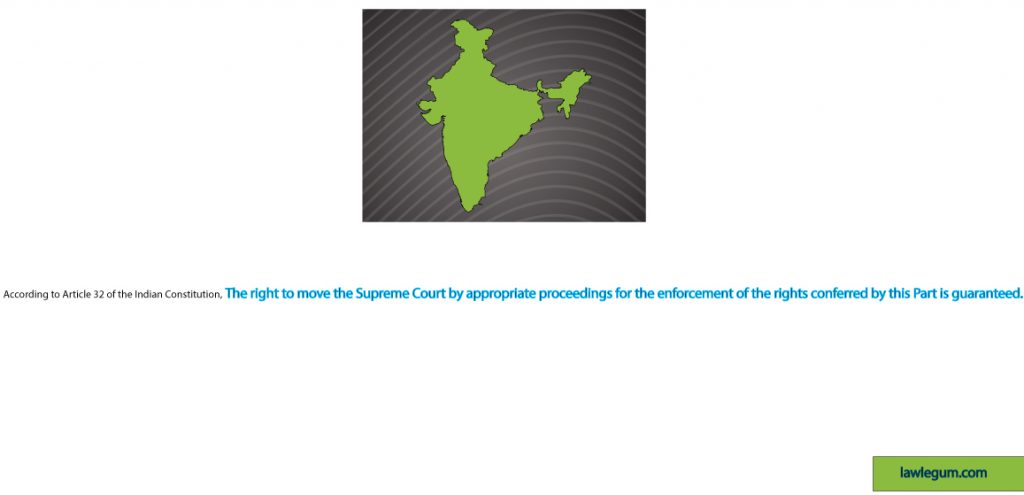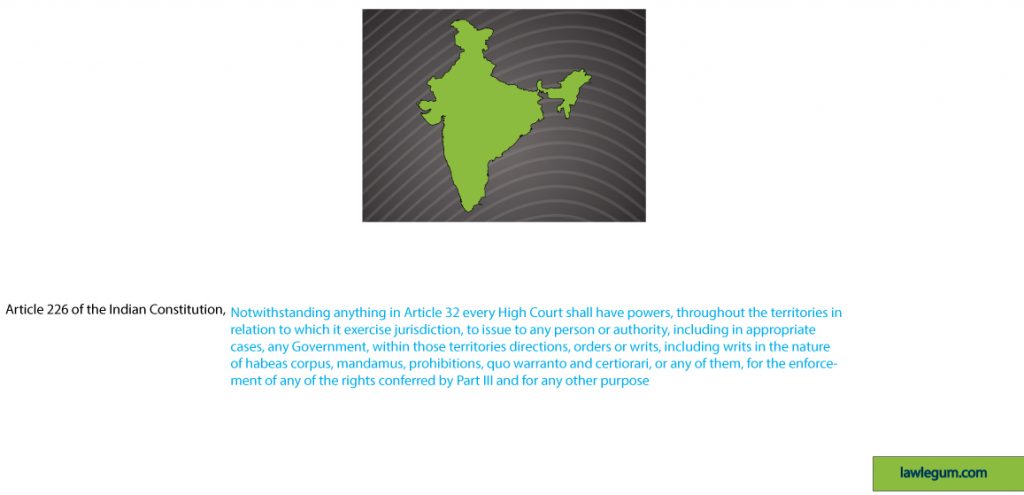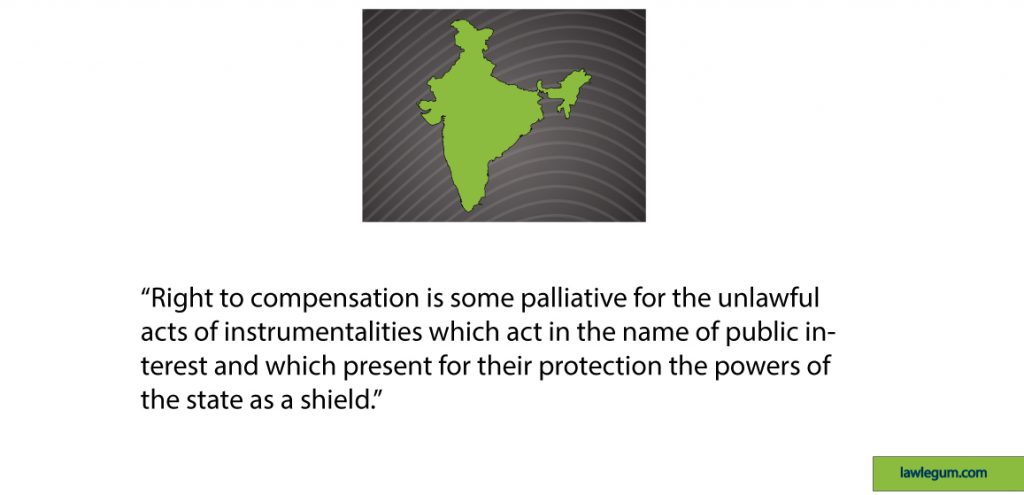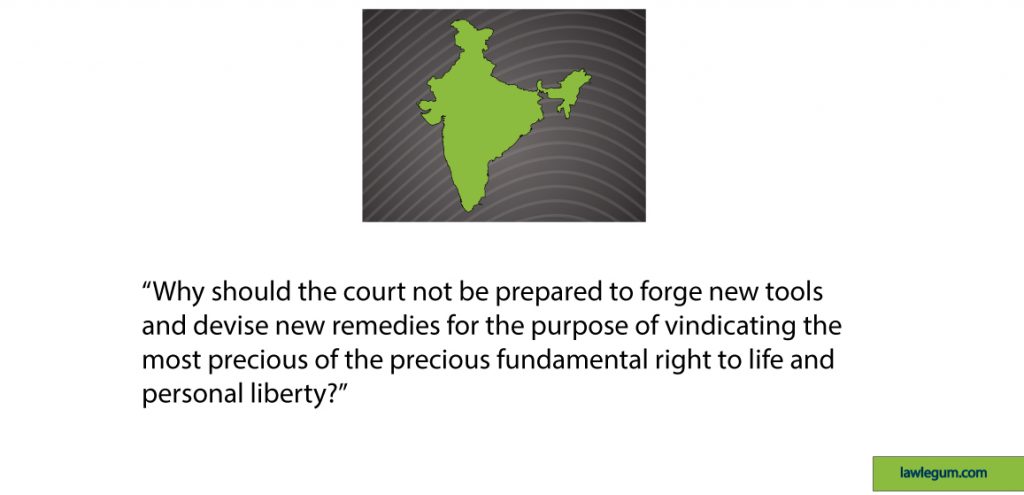Introduction
In this Article we will discuss public law compensation as a constitutional remedy for violations of fundamental rights. We will discuss Article 32 and Article 226 of the Indian Constitution inextricably with relevant case references.
The public law compensation is a new horizon in the constitutional remedy. In India the provision of compensation in public law was introduced by changing the existing jurisprudence. Compensation is a well-known private law remedy but recently the courts in India have introduced a new term namely ‘Constitutional Tort’ where public law and private law have merged.
What does Article 32 say?

Article 32 of the Indian Constitution incorporated the right to move the Supreme Court to seek justice when fundamental rights have been duly deprived. Article 32 also empowers the Supreme Court to issue directions or orders or writs whichever is ‘appropriate’ for the enforcement of fundamental rights conferred by part 3 of the constitution.
What does Article 226 say?

Article 226 of the Indian Constitution empowers the High Court with writ jurisdiction for the enforcement of fundamental rights.
The court while exercising writ jurisdiction under Article 226 of the Constitution can award ‘monetary compensation’ against the State and its public functionaries for its failure to protect the fundamental rights of the citizens. The constitution of India did not directly vest on the supreme court the power to award monetary compensation. The root of public law compensation lies in the liberal interpretation of the expression ‘appropriate’ used in the Article 32(2) of the constitution.
In the case of Rudul Sah v State of Bihar [1983]the Indian Supreme Court for the first time granted monetary compensation as a constitutional redress for violation of fundamental rights. In this case Rudul Sah was wrongfully confined for 14 years in jail after his acquittal. A PIL was filed in 1982 under Article 32 for the violation of right to life and liberty which is guaranteed under article 21 of the Indian Constitution. The Supreme Court ordered the State to pay Rs. 30,000 to the petitioner as a monetary compensation in addition to the Rs. 5,000 already paid for his rehabilitation. This case is a landmark judgment in the jurisprudence of the concept of state liability. The court interpreted the extent of its remedial power and granted the relief. The court said in this case that refusal to grant monetary compensation for the petitioner would be ‘mere lip service’ to his precious fundamental right to liberty which the state has so grossly infringed. Chandrachud, CJ in this case stated that –

After 10 years, in the case of Nilabati Behera v State of Orissa [1993] the Supreme Court of India awarded monetary compensation of Rs. 1,50,000 for the custodial death of Suman Behera who was petitioner’s son. The case was filed under Article 32 of the constitution for the enforcement of right to life and liberty which is guaranteed under article 21 of the constitution. It was stated that ‘award of monetary compensation under Article 32 by the Supreme Court or under Article 226 by the High Court is a constitutional redress only available in public law. It is built on the notion of strict liability for the infringement of fundamental rights.’ Defense of sovereign immunity is incorporated under Article 300 of the Indian constitution. The principle of sovereign immunity does not apply as a defense in public law although it can be applied in case of tort (private law).
Before these two landmark cases in Khatri v State of Bihar [1981] Bhagwati, J observed:

Public law compensation is a compensation in the nature of ‘exemplary damage’. If a citizen’s fundamental right has been infringed by any organ of the state, the supreme court is under constitutional obligation to grant appropriate relief to the citizen. Unlike England in India the sovereignty of constitution prevails. Constitution is the suprema lex of the land so the courts are under heavy obligation to shield the fundamental rights of the citizens.
In Paschim Bangla Khet Mazdoor Samity v State of West Bengal [1996] the Supreme Court recognized right to health under right to life and granted adequate compensation of Rs. 25,000 for the violation of fundamental right to life of a labor. In another case of Bhim Singh MLA v State of Jammu & Kashmir [1986] a member of assembly session was arrested with malicious intent. The police arrested him to restrain him from attending an assembly session. His right to liberty incorporated under Article 21 was violated. He filed a writ petition under Article 226 and the court granted him monetary compensation of Rs. 50,000 as a relief.
As declared by the court in Bandhua Mukti Mocha v Union of India [1984] the authority of supreme court is not only injunctive in scope but also remedial in scope and provides relief against a gross breach of a fundamental right already committed. In the case of Rural Litigation and Entitlement Kendra v State of UP [1991] it was stated that, the Supreme Court can assess the quantum of compensation.
The purpose of public law compensation is to impose limitation on activities of the public functionaries. No official body or functionary can get away with gross violation of fundamental rights of citizens. Another purpose is to ensure the citizens a legal system where their rights and interests are not only protected but also preserved.
In Chameli Singh v State of UP [1996] the court stated that ‘life under threat and fear is no life at all. Right to life includes right to live with utmost human dignity. It is the main responsibility of the state and other public functionaries to ensure that every citizen in custody is not deprived of his/her fundamental rights. The governmental bodies can not strike the liability if any citizen is deprived of their rights.’
In Jaywant P. Sankpal v Suman Gholap [2010] the petitioner’s son was illegally detained in custody and was tortured severely. The State Human Rights Commission ordered the state to pay Rs. 45,000 as monetary compensation. The order was later upheld by Bombay High Court and the Indian Supreme Court. The Indian Supreme Court in Radhakanta Majhi v State of Orissa [2014] proclaimed that monetary compensation cannot be a substitution or alternative for right to life but it is given by the court by way of ‘palliative care’.
In Puspa Reang v State of Tripura [2014] the case was a clear violation of right to life and liberty so the court invoked writ jurisdiction under article 226 to penalize the wrongdoer and to fix liability for a public wrong. The court granted Rs. 4 lacs of monetary compensation against the state for custodial torture and death of the victim.
Despite that there is no direct provision for awarding monetary compensation under Article 32 of Indian Constitution, the courts have exercised judicial activism and improved the jurisprudential basis regarding compensation in India. When a legal wrong or legal injury is committed against any person, he does not only suffer violation of fundamental rights but also suffers other injuries or damages such as mental injury, cost of litigation and loss of income etc. The constitution has imposed on the judiciary the authority to punish the guilty. But it is also the duty of the judiciary to compensate the sufferer although the guilty person has been punished. The object behind granting public law compensation by the supreme court is not only legal but also humanitarian. The courts play the role of ‘human institutions’ while dispensing justice so it is the responsibility of the court to award compensation against the state for violation of these rights.
Conclusion
In the light of perspectives expressed by the courts in the above-mentioned cases we conclude that the courts in India have extended its remedial power from time to time. In the present-day public law compensation has clearly become ‘a form of constitutional redress’ when a fundamental right protected by the constitution has been contravened. The judicial activism exercised by the courts in India has protected the basic human rights of its’ citizens in an appreciable manner.
- Summary of The Trail Smelter Arbitration Case | United States V Canada - April 8, 2023
- The Rainbow Warrior Case Summary | New Zealand V France - March 9, 2023
- The Corfu Channel Case Summary - December 10, 2022

